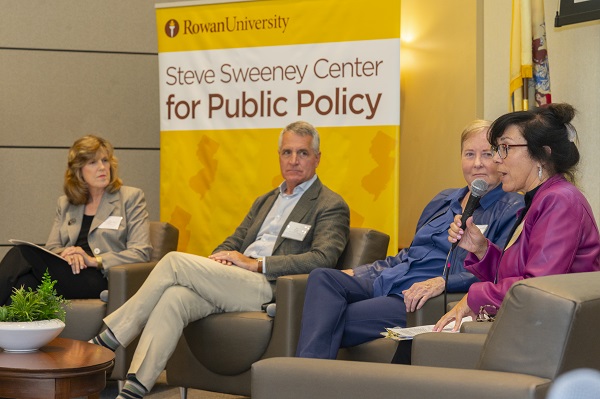Experts discuss solutions to the housing crisis for adults with disabilities at Sweeney Center conference
Experts discuss solutions to the housing crisis for adults with disabilities at Sweeney Center conference

Securing housing is one of the greatest challenges adults with disabilities face in New Jersey, according to Paul Aronsohn, New Jersey’s Ombudsman for Individuals with Intellectual or Developmental Disabilities and Their Families.
Aronsohn was one of more than a dozen experts, stakeholders, legislative leaders and advocates to speak at “Innovative Models, Unmet Needs,” a conference devoted to exploring housing solutions for individuals with intellectual and developmental disabilities presented by the Steve Sweeney Center for Public Policy at Rowan University on Sept. 24.
“People with disabilities should be able to choose where and how they live,” Aronsohn said. “This is the challenge: to meet the needs and preferences of a large, diverse disability community.”
Understanding the complex housing needs of adults with disabilities
The first-ever conference focusing on the development of congregate housing for adults with intellectual and developmental disabilities, and those with behavioral and medical issues, covered the needs, challenges and solutions for providing appropriate housing.
Adding to the challenge of developing suitable housing are the diverse needs of these individuals—and the high stakes, according to experts on the panel.
“People with disabilities have different needs, different preferences and deserve different options,” said Aronsohn. “We need to think big and think differently.”
Despite the complexities of the disability population’s housing needs, “this should not be hard to fix,” said Assemblyman Louis D. Greenwald, New Jersey Assembly majority leader and co-chair of the Legislative Disability Caucus that inspired the conference. “It allows for an opportunity for your children, our children, to thrive and succeed.”
Lisa McCauley Parles, a parent of an adult with disabilities and an attorney who represents the needs of individuals in this community, has contributed to efforts to build an intentional community for adults with disabilities that would serve the full spectrum of the diverse population’s needs.
“Don't focus just on the buildings,” said Parles. “Take time to look at how you're going to create an agency with a long-term plan that's going to do the most important thing, which is survive us.”
To Parles, this emphasis on the longevity of housing solutions for adults with disabilities that will live on even after individuals’ parents are gone is critical. Other parent advocates shared the same concern.
“This area is probably the scariest as a parent,” said former New Jersey State Senate President Steve Sweeney, the father of an adult with disabilities. “Where’s my daughter going to live when I'm gone?”
'A cornerstone of life'
The consensus among the conference speakers was that housing for adults with disabilities is more than just physical shelter.
“It's not overstating it to call housing a cornerstone of life,” said Jonathan Seifried, assistant commissioner of the New Jersey Division of Development Disabilities. “It provides security for the people that live within it.”
Cyndy Hayes, Ph.D., founder and CEO of Autism Wellbeing and a parent of an adult with disabilities, said that finding a “forever home” for adults with disabilities “was not about the building.” Rather, she noted, the compassionate care that skilled professionals provide in the residence and the trust and relationships they build with their patients are what make these housing solutions suitable.
Innovative solutions to a longstanding problem
“This housing crisis has been here for decades,” said Christopher Manente, Ph.D., executive director of the Rutgers Center for Adult Autism Services. “This is a community of people that have largely felt abandoned.”
While the traditional model of housing for adults with disabilities in New Jersey has historically been four-person group homes, Seifried explained, a statewide transition plan approved in 2023 integrates person-centered planning, separation of housing and services, individual choice and flexibility.
“The rigidity that the previous statewide transition plan showed for individuals with disabilities did not lend itself to solving the unique needs of those persons,” Seifried said.
With this flexibility, stakeholders have explored new solutions to the housing crisis, most notably campus-based intentional communities. By eliminating prohibitions on housing built on campuses, the new plan paved the way for a housing project at Rowan College of South Jersey (RCSJ) now under construction through the Academy for Neurodiversity at the Stephen M. Sweeney Center for Special Services.
“This model may be the first of its kind,” said Chad Bruner, Gloucester County administrator and chairman of the Rowan University Board of Trustees. “This community will allow our residents to benefit from vital services on campus.” Services include medical facilities, educational programs and job placement services, Bruner noted.
Through this model entrenched in a community college campus with access to the services of Rowan University, Gloucester County and the state Division of Development Disabilities, “we can make housing available, accessible, affordable, with appropriate delivery in different layers of service,” said Frederick Keating, Ph.D., president of RCSJ.
Parles sees collaborating with higher education institutions as a clear answer.
“We need to develop partnerships with colleges and universities,” she said, noting her experiences working with Rowan on technology grants. “The need is immense. The suffering is very real. But the possibilities are right before us.”